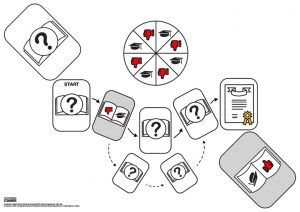The topic of academic integrity is not always a particularly interesting or easy thing to get students to think about. Recently the School of Business hosted a really engaging session by Dr Amanda White from UTS on her development of a board game to get students talking about academic integrity.
Amanda teaches accounting, and in 2017, after introducing what she hoped would be a very engaging and authentic assessment activity, she discovered that a large percentage of her students had engaged in misconduct! After a very stressful and time-consuming process of pursuing the misconduct cases, she realised that the way in which academic integrity is currently taught isn’t really working. Students aren’t engaged with the concept of academic integrity and don’t understand the rules surrounding academic misconduct. Most of the information comes from policy pages, and is delivered in a dry and boring way with little opportunity for learning the topic in an engaging way
As an accounting academic, she decided to look to the literature surrounding the idea of fraud and found that people commit fraud when three phenomena occur:
- Incentives/pressure
- Opportunity
- Rationalisation

This is known as the ‘Fraud Triangle‘. She realised that it’s really hard to prevent students from experiencing possible incentives and pressure, and is it infeasible to remove all opportunity. She therefore decided to focus on the area of rationalisation. This led her to the idea of creating a board game to introduce students to concepts of academic integrity, and at the same time encourage them to discuss scenarios in a safe space.
The game is really a trojan horse for conversations about academic integrity. By playing the game, students discuss scenarios about academic integrity and how they would behave in a real-life situation. Ideally the game is adapted for a particular discipline or subject area, or could be played before an assessment activity. The resources are freely available to download and adapt for your unit: http://www.aibg.amandalovestoaudit.com/
The game is a great way of introducing academic integrity in an engaging and non-threatening way. It also works as a conversation starter or an ice-breaker for an early tutorial as required by the Academic Honesty in Coursework Policy 2015
Other resources include a video of how to play the game and a film that UTS created to show the dreadful potential consequences of academic dishonesty.






2 Comments